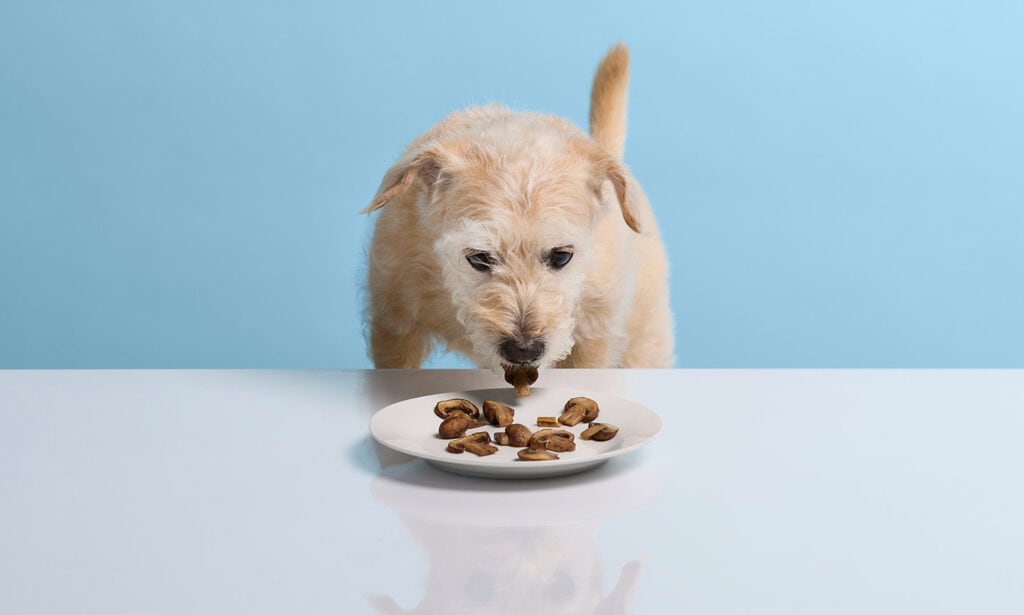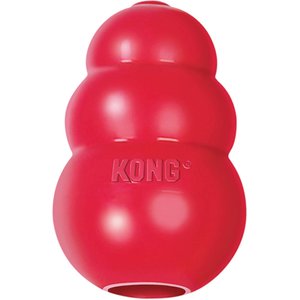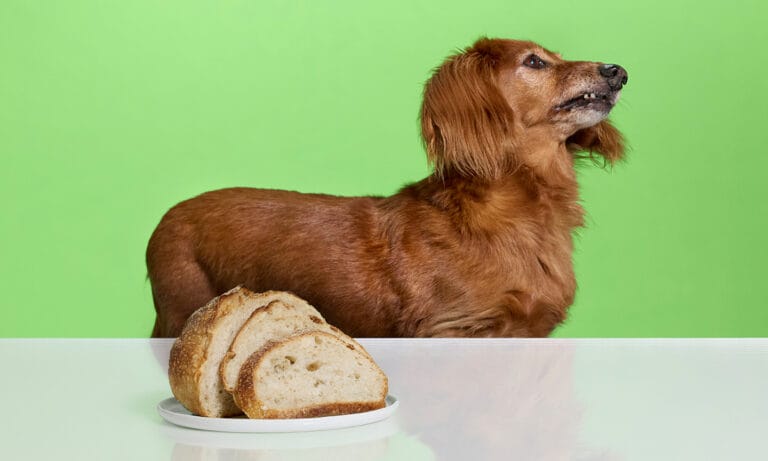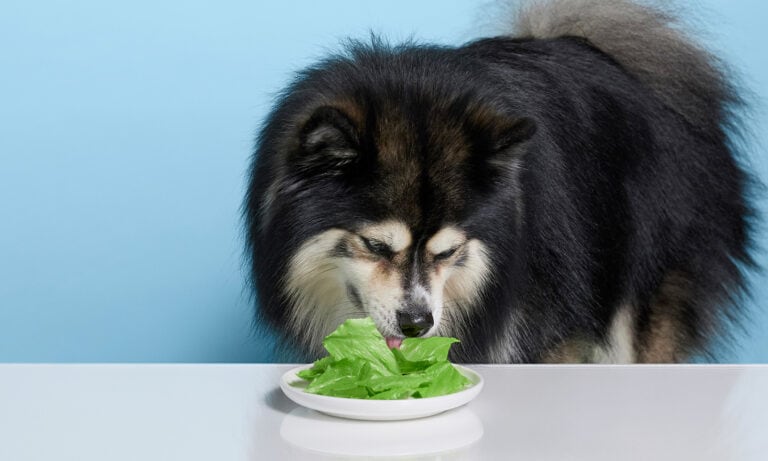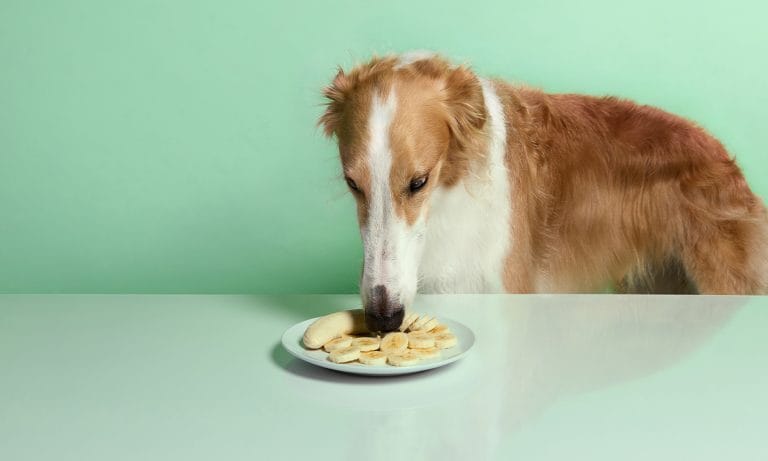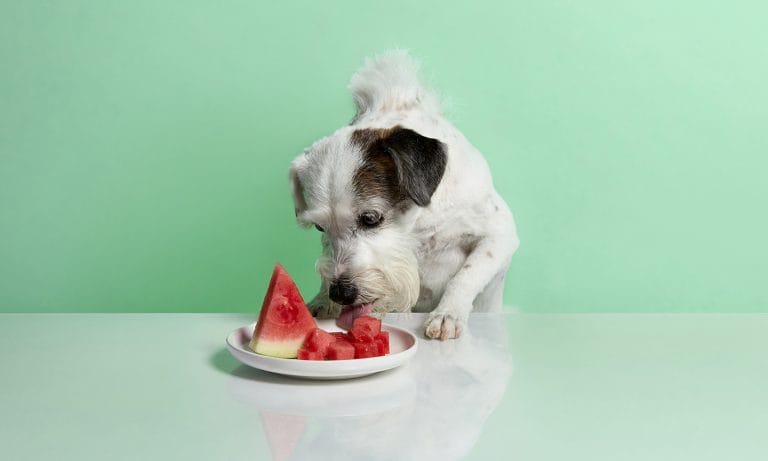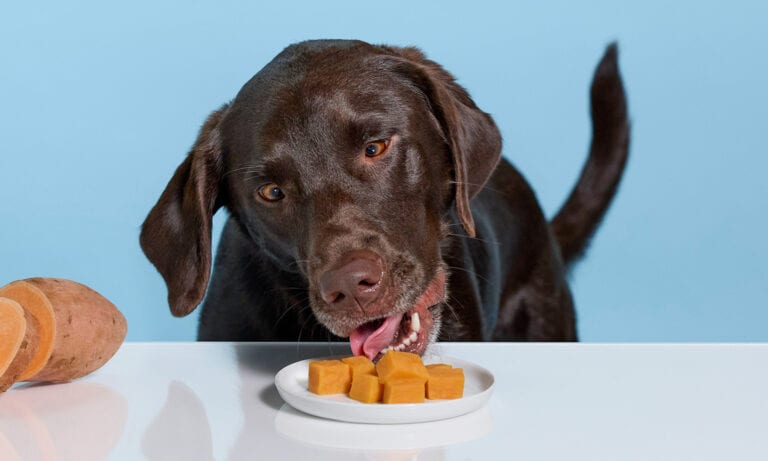You’re chopping up cremini mushrooms for your famous risotto, when you feel a pair of eyes fixed on you. No, it’s not a burglar, but your dog, drawn by the earthy aroma. But can dogs eat mushrooms?
The short answer is it depends.
While mushrooms sold at grocery stores are typically safe for Fido in moderation, several types of wild mushrooms are highly toxic to dogs.
We spoke to a vet expert to understand which mushrooms are safe for dogs and which are poisonous. Plus, we share how to treat your dog to non-toxic mushrooms.
Before serving any new foods to your pet, consult with your veterinarian first.
Expert input provided by Dr. Tara Miller, DVM, medical director and veterinarian at Veterinary Emergency Group in Denver, Colorado.
Click to jump to each section:
Which Mushrooms Are Toxic to Dogs?
When it comes to mushrooms, the potential danger lies in wild mushrooms, many of which can be highly poisonous to dogs, just as they are for humans. These mushrooms grow in damp locations such as lawns, landscaping areas and wooded areas.
There are over 10,000 known mushroom species, but only about 100 types are poisonous to dogs and other mammals. Some of the most commonly encountered toxic species in the U.S. include:
- Amanita phalloides (death cap)
- Amanita bisporigera (death angel)
- Amanita gemmata (jeweled death cap)
- Amanita muscaria (fly agaric)
- Amanita pantherina (panther cap)
- Clitocybe dealbata (ivory funnel)
- Galerina marginata (deadly galerina)
- Gyromitra esculenta (false morel)
- Inocybe species
What Are the Symptoms of Mushroom Poisoning in Dogs?
Mushroom poisoning in dogs can cause a range of symptoms depending on the type of mushroom ingested.
These symptoms can occur anywhere from 15 minutes to several hours after ingestion.
The following are some common signs of mushroom poisoning in dogs:
- Gastrointestinal distress: This is often the first sign and can include symptoms such as vomiting, diarrhea, excessive drooling and abdominal pain.
- Neurological issues: Some toxic mushrooms can affect the nervous system, leading to symptoms such as weakness, unsteady movement, vocalizations, tremors, seizures and in severe cases, coma.
- Cardiac abnormalities: Some mushrooms can cause changes in heart rate, rhythm and blood pressure.
- Changes in behavior or mood: This can include agitation or lethargy.
- Difficulty breathing: In some cases, dogs might exhibit signs of respiratory distress, like panting or labored breathing.
- Liver and kidney damage: Certain mushrooms can cause severe liver and kidney damage. Signs may not appear immediately, but can include increased drinking and urination, jaundice (yellowing skin and whites of the eyes) and eventually severe lethargy or collapse.
What Do I Do If My Dog Ate Toxic Mushrooms?
If you suspect your dog has ingested a potentially toxic wild mushroom, act quickly and follow these steps.
- Remove any remaining mushroom pieces from your dog’s mouth. This can prevent them from swallowing more of the mushroom.
- Collect a sample of the mushroom. If possible, collect a sample of the mushroom your dog ate. This could help your veterinarian identify the type of mushroom and determine the appropriate treatment. Use gloves or a bag to avoid direct contact.
- Take your dog to your veterinarian or an emergency veterinary clinic immediately. Do not waste time trying to identify the type of mushroom yourself. Time is of the essence when dealing with potential mushroom toxicity. Inform your veterinarian or the emergency clinic that you believe your dog has ingested a mushroom, describe any symptoms you’ve noticed and let them know you’re on your way.
- If directed, induce vomiting. In some cases, your veterinarian may instruct you to induce vomiting in your dog before taking them to the clinic. Never attempt to do this without professional guidance, as it can sometimes cause more harm than good.
- Contact the Animal Poison Control Center. If you can’t reach a veterinarian, call an animal poison hotline such as ASPCA Animal Poison Control Center at (888) 426-4435 or Pet Poison Helpline at 855-764-7661.
Remember, mushroom poisoning in dogs can be life-threatening. Prompt action is critical to the best possible outcome for your furry friend. It’s always better to be safe and assume any mushroom your dog consumes outside could be harmful.
How Do I Prevent My Dog from Eating Toxic Mushrooms?
Keeping your dog safe from toxic mushrooms involves prevention and vigilance.
Here are some strategies to prevent your dog from ingesting potentially poisonous mushrooms.
Perform regular yard checks.
Regularly inspect your yard or any outdoor spaces your dog frequents for the presence of mushrooms.
Wearing gloves, remove any you find, even if you’re unsure about the type.
It’s better to err on the side of caution. And always supervise your dog while they’re playing outdoors, especially in wooded areas where mushrooms commonly grow.
Learn mushroom identification.
Familiarize yourself with the appearance of common toxic mushrooms in your region.
While it’s challenging to accurately identify all types of mushrooms—given there are thousands of species—having a basic understanding of the most dangerous varieties can help you recognize them outdoors (and avoid those areas).
This knowledge can also be helpful if your dog ingests a mushroom, as you can tell your veterinarian what type you think it might be.
Leash walks in new areas.
Keep your dog on a leash, especially in new areas or during mushroom seasons (usually spring, summer and fall, particularly after heavy rains). This will allow you to keep them from consuming any mushrooms.
Teach the “leave it” command.
Train your dog to understand and obey commands, like “leave it” or “drop it.” This can help prevent them from picking up or eating something they shouldn’t, such as a mushroom.
Learn how to train your dog to leave it. (It's easier than you think!)
Provide adequate nutrition.
A well-fed dog is less likely to eat random objects or plants out of hunger or nutritional deficiency.
Despite our best efforts, dogs can sometimes still get into things they shouldn’t. If you suspect your dog has ingested a wild mushroom, contact a veterinarian immediately.
Which Mushrooms Are Safe for Dogs?
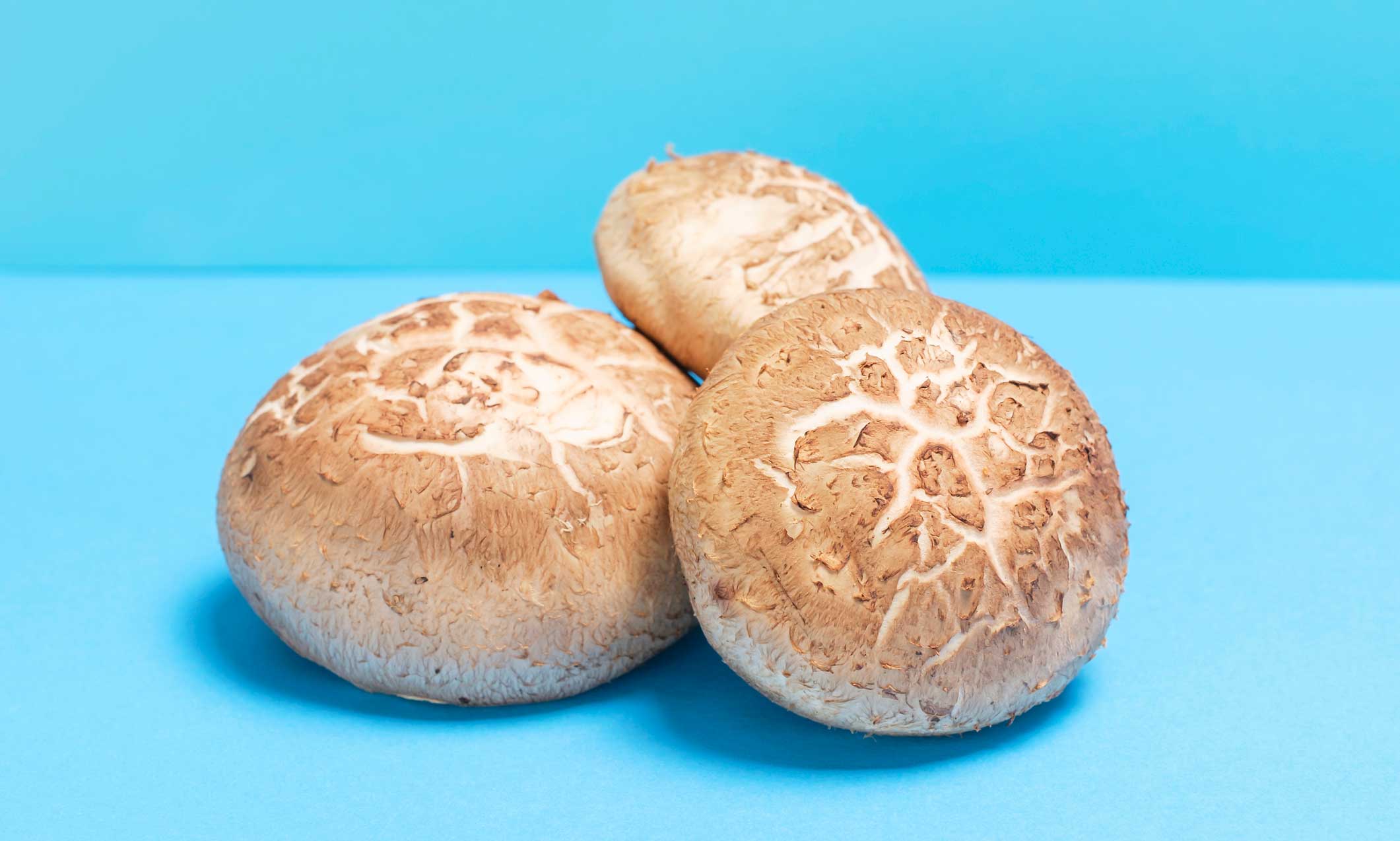
Commonly consumed mushroom varieties that are generally considered safe for dogs include:
- White button
- Cremini
- Portabella
- Baby bella
- Shiitake
- Porcini
- Maitake
Additionally, certain medicinal mushrooms may be safe and beneficial for dogs. Some examples include:
- Reishi
- Cordyceps
- Lion’s mane
- Turkey tail
- Chaga
How Do I Feed Safe Mushrooms to My Dog?
Below we’ll share some ways to incorporate safe mushrooms into your dog’s diet.
But first, let’s review some basic ground rules for feeding your dog mushrooms:
- Cooked mushrooms are best. Cooking mushrooms not only makes the mushrooms more digestible, but it also destroys any potential harmful bacteria that might be present.
- Serve in moderation. Even when giving your dog safe mushrooms, it’s essential to serve them in moderation. Start with a small amount to see how your dog reacts and gradually increase the quantity if there are no adverse effects. And remember, treats and human foods, including mushrooms, should make up no more than 10 percent of a dog’s daily calories. For example, if your dog eats 600 calories a day, their treats should not exceed 60 calories. One-half cup of chopped white mushrooms, for example, contains about 8 calories. The rest of your dog’s nutritional needs should be met with nutritionally-balanced dog food.
- Chop or puree. Mushrooms should be chopped or pureed to prevent choking and facilitate digestion. Large pieces of mushroom can pose a choking hazard, especially for small dogs.
- Don’t add seasonings. Avoid adding seasonings to mushrooms you feed your dog. Onions or garlic are particularly important to avoid, as these are poisonous to dogs.
Now, here are some ways to include safe mushrooms in your dog’s meals:
1Use as a Food Topper
Chopped, cooked mushrooms have a meat-like texture and can be used as a delicious and nutritious topper for your dog’s regular meals.
Simply sprinkle 1 to 4 tablespoons of cooked mushrooms (depending on your pup’s size) over their dog food.
2Make Dehydrated Mushroom Treats
For a tasty, crunchy snack for your dog, dehydrate mushrooms in the oven. Here’s how:
- Clean the mushrooms, dry well, and slice into thin pieces.
- Place the mushrooms on a baking sheet fitted with a wire rack.
- Bake the mushrooms in the oven at 170°F until they’re crisp, about 2-3 hours.
Note: Prop the oven door open with a wooden spoon while cooking to vent steam.
Using a dehydrator also works!
3Stuff in Toys
To keep your dog busy and provide them with mental stimulation, stuff a KONG Classic Dog Toy or similar food-dispensing toy with a mixture of their regular kibble, chopped, cooked mushrooms and a bit of dog-friendly broth, like Brutus Broth Bone Broth. Freeze the KONG—and serve!
4Make a Mushroom Gravy
Make a simple, dog-friendly gravy by blending dog-friendly broth and cooked mushrooms. Once cooled, you can pour 1-4 tablespoons of the gravy (depending on your pup’s size) over your dog’s regular kibble for a special treat!
5Seek Dog Food with Mushroom
If you’re looking for an easy and convenient way to include mushrooms in your dog’s diet, consider store-bought dog food that contains safe mushrooms, like Nature’s Logic Canine Beef Meal Feast All Life Stages Dry Dog Food.
6Try Mushroom Supplements
There are several mushroom supplements available that are specifically designed for dogs. These often include medicinal mushrooms, like turkey tail, reishi, maitake and shiitake, all of which are known for their immune-boosting properties and rich antioxidant content. A few examples include…
Such supplements may be particularly beneficial if your dog is battling an illness where a boosted immune system could provide support. They can also be used for general wellness and preventative health care.
As with any new supplement, consult with your veterinarian before adding a mushroom supplement to your dog’s routine to ensure they’re suitable for their specific health needs.
The Benefits of Mushrooms for Dogs
Non-toxic mushrooms are rich in essential nutrients, including vitamins (B vitamins and vitamin D), minerals (selenium, potassium and copper) and antioxidants, which can help support your dog’s overall health.
Adding mushrooms to your dog’s diet may help...
- Support liver and kidney function
- Stabilize blood sugar and metabolism
- Lower cholesterol
- Boost weight loss
- Prevent fatty liver disease
- Boost the immune system
- Reduce blood pressure
- Prevent heart disease
- Prevent and battle cancer
Explore Other Dog-Friendly Human Foods
More foods dogs can eat:
Share:
